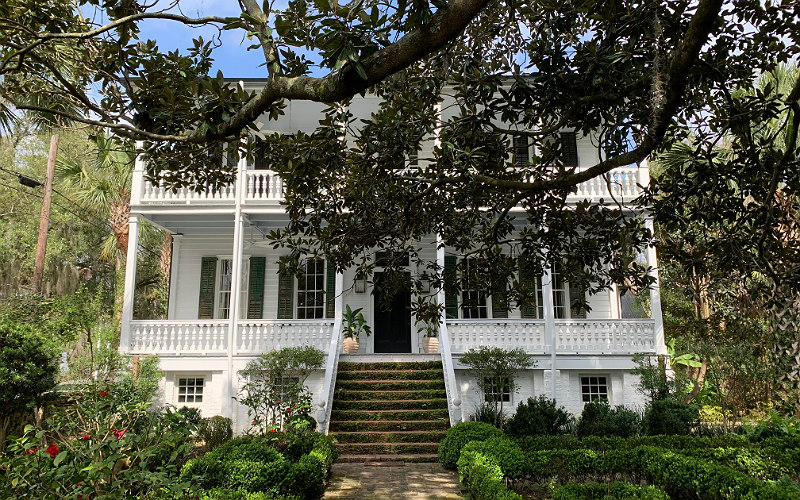Now a private residence, this house has particular significance, according to a reader who submitted the picture. Two-part mystery this week: Where is the house and what is its significance. Send your guess to editor@charlestoncurrents.com. And don’t forget to include your name and the town in which you live.
Our previous Mystery Photo
 Our March 4 mystery, “There’s a big clue in this mystery,” was the perfect pre-St. Patrick’s Day photo. It showed Hibernian Hall on Meeting Street in Charleston (the harp with the green background was the clue).
Our March 4 mystery, “There’s a big clue in this mystery,” was the perfect pre-St. Patrick’s Day photo. It showed Hibernian Hall on Meeting Street in Charleston (the harp with the green background was the clue).
A warm congratulations to all who correctly identified the mystery: Chris Brooks of Mount Pleasant; Stephen Yetman, now of Savannah; Cynthia Jones of York; Margaret Fabri and Archie Burkel, both of James Island; George Graf of Palmyra, Va.; and Pat Deussing of Apex, N.C.
Fabri added, “The Irish Harp was sort of a ‘giveaway.’ This is the Hibernian Hall…the home of the famous St. Patrick’s Day party to which NO WOMEN are allowed!”
Burkel outlined the importance of the harp: “Always known as a symbol of ‘Irishness,’ the harp became a symbol for the resistance of Irish people against the Crown of England. That is why it was banned by the Crown by the end of the Middle Ages. Today many Irish companies and institutions use the harp in their logos and emblems. like our Hibernian Hall. It was originally built as a meeting place for the Hibernian Society, an Irish benevolent organization founded in 1801. It has continued to have an illustrious history befitting our illustrious Charles-town.”
Graf noted, “The Hibernian Society of Charleston was created to help Irish settlers following the 1798 rebellion. It is the oldest organization of ethnic origin with its own site in the country,” according to charlestoncitypaper.com. He also added, according to revolvy.com, “the first floor [in 1860] was used as a meeting space, and the second floor as living quarters for the delegates, who slept on hundreds of cots set up for the occasion. No one Democratic candidate could garner sufficient support. The party’s divisiveness contributed to the election of the Republican candidate, Abraham Lincoln.”
- Send us a mystery: If you have a photo that you believe will stump readers, send it along (but make sure to tell us what it is because it may stump us too!) Send it along to editor@charlestoncurrents.com.




 We Can Do Better, South Carolina!
We Can Do Better, South Carolina!
























